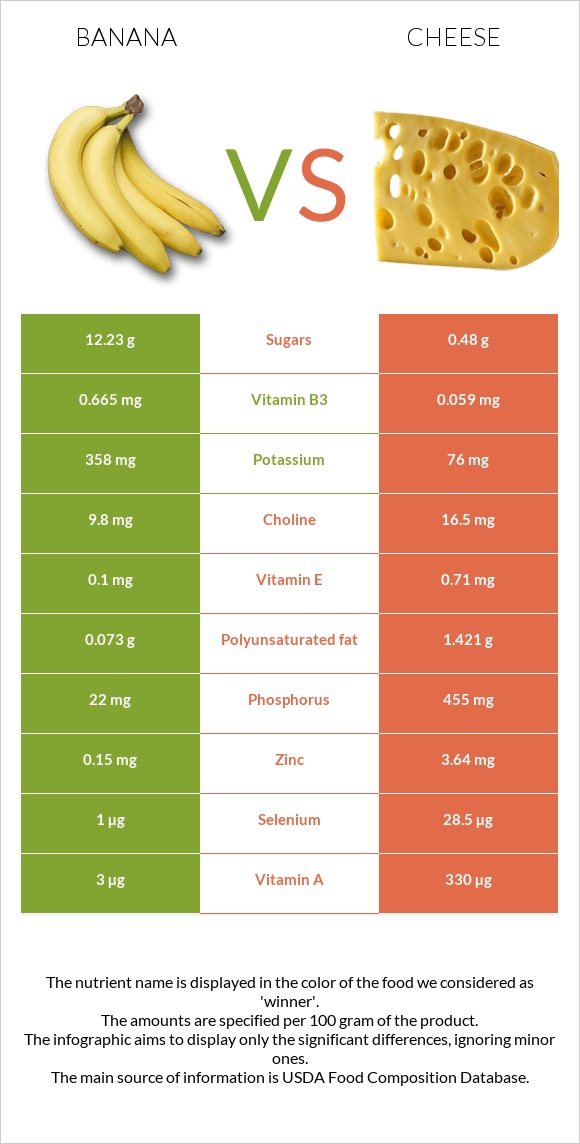Banana vs. Cheese — In-Depth Nutrition Comparison
Compare
How are bananas and cheese different?
- Cheese has more calcium, phosphorus, selenium, vitamin B12, zinc, vitamin B2, and vitamin A than bananas.
- Daily need coverage for saturated fat for cheese is 94% higher.
- Bananas have less saturated fat.
- Cheese has a lower glycemic index (0) than bananas (48).
Bananas, raw and Cheese, cheddar are the varieties used in this article.
Infographic

Infographic link
Mineral Comparison
Mineral comparison score is based on the number of minerals by which one or the other food is richer. The "coverage" charts below show how much of the daily needs can be covered by 300 grams of the food.
| Contains more PotassiumPotassium | +371.1% |
| Contains more IronIron | +85.7% |
| Contains more CopperCopper | +160% |
| Contains less SodiumSodium | -99.8% |
| Contains more ManganeseManganese | +900% |
| Contains more CalciumCalcium | +14100% |
| Contains more ZincZinc | +2326.7% |
| Contains more PhosphorusPhosphorus | +1968.2% |
| Contains more SeleniumSelenium | +2750% |
Vitamin Comparison
Vitamin comparison score is based on the number of vitamins by which one or the other food is richer. The "coverage" charts below show how much of the daily needs can be covered by 300 grams of the food.
| Contains more Vitamin CVitamin C | +∞% |
| Contains more Vitamin B3Vitamin B3 | +1027.1% |
| Contains more Vitamin B6Vitamin B6 | +456.1% |
| Contains more Vitamin AVitamin A | +10900% |
| Contains more Vitamin EVitamin E | +610% |
| Contains more Vitamin DVitamin D | +∞% |
| Contains more Vitamin B2Vitamin B2 | +486.3% |
| Contains more Vitamin B5Vitamin B5 | +22.8% |
| Contains more Vitamin B12Vitamin B12 | +∞% |
| Contains more Vitamin KVitamin K | +380% |
| Contains more FolateFolate | +35% |
All nutrients comparison - raw data values
| Nutrient |  |
 |
DV% diff. |
| Saturated fat | 0.112g | 18.867g | 85% |
| Calcium | 5mg | 710mg | 71% |
| Phosphorus | 22mg | 455mg | 62% |
| Fats | 0.33g | 33.31g | 51% |
| Selenium | 1µg | 28.5µg | 50% |
| Vitamin B12 | 0µg | 1.1µg | 46% |
| Protein | 1.09g | 22.87g | 44% |
| Vitamin A | 3µg | 330µg | 36% |
| Cholesterol | 0mg | 99mg | 33% |
| Zinc | 0.15mg | 3.64mg | 32% |
| Sodium | 1mg | 653mg | 28% |
| Vitamin B2 | 0.073mg | 0.428mg | 27% |
| Vitamin B6 | 0.367mg | 0.066mg | 23% |
| Monounsaturated fat | 0.032g | 9.246g | 23% |
| Calories | 89kcal | 404kcal | 16% |
| Manganese | 0.27mg | 0.027mg | 11% |
| Vitamin C | 8.7mg | 0mg | 10% |
| Fiber | 2.6g | 0g | 10% |
| Polyunsaturated fat | 0.073g | 1.421g | 9% |
| Potassium | 358mg | 76mg | 8% |
| Carbs | 22.84g | 3.09g | 7% |
| Fructose | 4.85g | 0g | 6% |
| Copper | 0.078mg | 0.03mg | 5% |
| Vitamin E | 0.1mg | 0.71mg | 4% |
| Vitamin B3 | 0.665mg | 0.059mg | 4% |
| Vitamin D | 0 IU | 24 IU | 3% |
| Vitamin D | 0µg | 0.6µg | 3% |
| Iron | 0.26mg | 0.14mg | 2% |
| Starch | 5.38g | 2% | |
| Vitamin B5 | 0.334mg | 0.41mg | 2% |
| Vitamin K | 0.5µg | 2.4µg | 2% |
| Folate | 20µg | 27µg | 2% |
| Choline | 9.8mg | 16.5mg | 1% |
| Net carbs | 20.24g | 3.09g | N/A |
| Magnesium | 27mg | 27mg | 0% |
| Sugar | 12.23g | 0.48g | N/A |
| Vitamin B1 | 0.031mg | 0.029mg | 0% |
| Trans fat | 0g | 0.917g | N/A |
| Tryptophan | 0.009mg | 0.547mg | 0% |
| Threonine | 0.028mg | 1.044mg | 0% |
| Isoleucine | 0.028mg | 1.206mg | 0% |
| Leucine | 0.068mg | 1.939mg | 0% |
| Lysine | 0.05mg | 1.025mg | 0% |
| Methionine | 0.008mg | 0.547mg | 0% |
| Phenylalanine | 0.049mg | 1.074mg | 0% |
| Valine | 0.047mg | 1.404mg | 0% |
| Histidine | 0.077mg | 0.547mg | 0% |
| Omega-3 - EPA | 0g | 0.01g | N/A |
| Omega-3 - DHA | 0g | 0.001g | N/A |
| Omega-3 - DPA | 0g | 0.017g | N/A |
| Omega-6 - Eicosadienoic acid | 0.007g | N/A |
Macronutrient Comparison
Macronutrient breakdown side-by-side comparison
| Contains more CarbsCarbs | +639.2% |
| Contains more WaterWater | +102.4% |
| Contains more ProteinProtein | +1998.2% |
| Contains more FatsFats | +9993.9% |
| Contains more OtherOther | +347% |
Fat Type Comparison
Fat type breakdown side-by-side comparison
| Contains less Sat. FatSaturated fat | -99.4% |
| Contains more Mono. FatMonounsaturated fat | +28793.8% |
| Contains more Poly. FatPolyunsaturated fat | +1846.6% |
Carbohydrate type comparison
Carbohydrate type breakdown side-by-side comparison
| Contains more StarchStarch | +∞% |
| Contains more SucroseSucrose | +∞% |
| Contains more GlucoseGlucose | +1815.4% |
| Contains more FructoseFructose | +∞% |
| Contains more MaltoseMaltose | +∞% |
| Contains more LactoseLactose | +∞% |
| Contains more GalactoseGalactose | +∞% |





